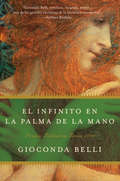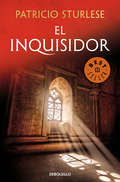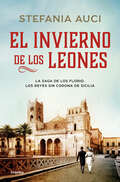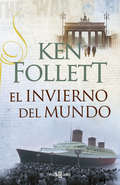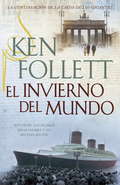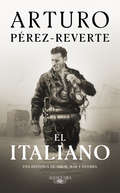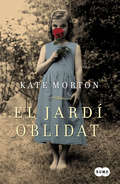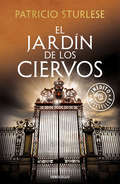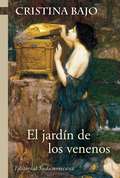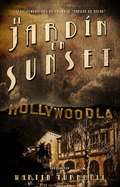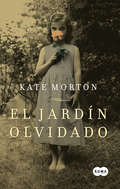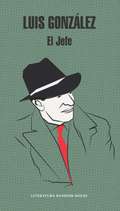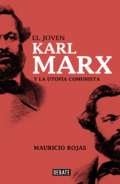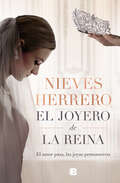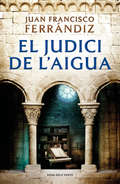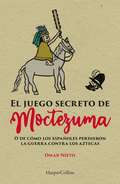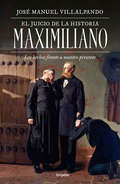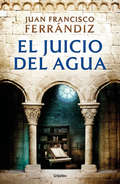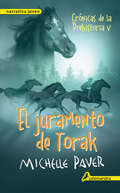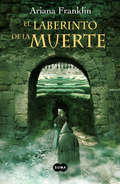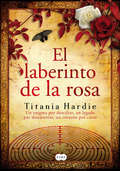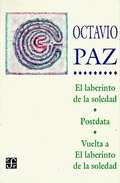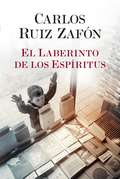- Table View
- List View
El infinito en la palma de la mano: Novela
by Gioconda BelliEl mágico relato de nuestros orígenes es probablemente el que más fascinación ha inspirado en la humanidad a lo largo de los tiempos. Pero, más allá de los cuarenta versículos que la Biblia dedica a Adán y Eva, más allá incluso de la leyenda, ¿cómo sería la vida de aquella inocente, valiente y conmovedora primera pareja? ¿Cómo sería aquel universo primigenio? ¿Cuál fue el impulso que motivó a que Eva tomara la manzana prohibida? ¿Y qué pensamientos le pasaron por la cabeza a ambos una vez que comprendieron las consecuencias de lo que Eva acababa de hacer? Prepárese para adentrar en un mundo fascinante y primitivo que lo llevará al comienzo de todo, a la historia en la que se basa la civilización judío-cristiana. Poesía y misterio se dan la mano en esta sorprendente novela que nos presenta al primer hombre y la primera mujer descubriéndose y descubriendo su entorno, experimentando el desconcierto ante el castigo, el poder de dar vida y la crueldad de matar para sobrevivir. Esta novela que nos brinda Gioconda Belli es una parábola para nuestros tiempos y para un futuro inesperado que logra cautivar y complacer cada centímetro de nuestra alma.
El inquisidor
by Patricio SturleseUn thriller trepidante ambientado en el turbulento final del siglo XVI. Un libro sagrado, prohibidoy que puede hacer cimbrar los cimientos de la Iglesia. 1597, aposentos de Clemente VIII, en el Vaticano. Angelo DeGrasso, Inquisidor General de Liguria, es recibido en audiencia privada por el Papa, el Superior General de la Inquisición y un extraño astrólogo llamado Darko. Le acaban de comunicar que un hereje llamado Eros Gianmaria, que ha sido trasladado desde Venecia, guarda aún un terrible secreto: es el único que conoce el paradero de la última copia de un libro prohibido, el Necronomicón, y Angelo ha de usar su pericia para conseguir una confesión. Pero no dispondrá de mucho tiempo para hacerlo, pues en pocos días ha de partir hacia el Nuevo Mundo en una misión que no le será comunicada hasta que noesté embarcado. Al descender la escalera de la basílica de San Pedro, en un frío día de otoño, Angelo presiente que su vida va a dar un giro. El implacable Inquisidor General de Liguria no tardará mucho en descubrir que ni siquiera él es lo que parece... Una novela apasionante que nos transporta al turbulento final del siglo XVI, en el que la Iglesia Católica mata por defender la ortodoxia y conservar su poder; en el que los aquelarres pueblan los bosques italianos bajo la protección de Satán y de la Luna; en el que todos están dispuestos a morir por su fe, pero ¿qué fe?
El invierno de los leones
by Stefania AuciEl invierno de los leones es el triunfo y el trágico declive de los Florio, la poderosa dinastía de Los leones de Sicilia, el mayor éxito editorial de los últimos años en Italia. Para los Florio los tiempos de humillación y miseria son solo un recuerdo lejano. Hoy, la ciudad entera los admira, los honra y los teme. Ignacio, el heredero, por el contrario, no teme a nadie. Sabe que el destino de la saga está en sus manos y quiere extender su poder más allá de Sicilia, influir en la política que se hace en Roma y dominar el Mediterráneo. Por estas aspiraciones Ignacio renunció a un amor que habría trastocado su futuro, un amor cuya sombra no le abandonará nunca. Su hijo Ignazziddu, en cambio, sí tiene miedo. Recibe el legado familiar con apenas veinte años, pero no está dispuesto a sacrificarse por la familia, a ser esclavo de su linaje. Intenta tomar las riendas del imperio, pero se enfrenta a un mundo cambiante, agitado por fuerzas nuevas e incontrolables que acabarán mostrándole que no basta solo con tener la sangre de los Florio para imponerse, para triunfar. Necesita algo que tenían su padre y su abuelo, pero que a él le falta. ¿Cuál ha sido su error? Este padre y este hijo, tan diferentes, tendrán a su lado a dos mujeres también muy distintas: Giovanna, la esposa de Ignazio, dura y frágil como el cristal, llena de pasión y hambrienta de amor, y Franca, esposa de Ignazziddu, la mujer más bella de Europa, cuya dorada existencia sufrirá los golpes de un destino cruel. Estas dos mujeres serán las verdaderas representantes de la historia exaltada y terrible, gloriosa y trágica de los leones de Sicilia. La crítica ha dicho:«Un acontecimiento literario».La Repubblica «La maravillosa y terrible historia que ha embrujado a los lectores de Los leones de Sicilia».Corriere della Sera
El invierno del mundo
by Ken Follett"Esta es la historia de mis abuelos y de los vuestros, de nuestros padres y de nuestras propias vidas. De alguna forma es la historia de todos nosotros". --Ken Follett En el año 1933, Berlín es un foco de agitación política y social. Lady Maud, ahora la esposa de Walter von Ulrich y madre de dos hijos, publica en una revista semanal artículos que ridiculizan al Partido Nazi, mientras que Walter manifiesta su oposición en el Parlamento. Sin embargo, parece que nada podrá frenar el poder ascendente de Adolf Hitler. Cuando Ethel Williams y su hijo Lloyd visitan a la familia Von Ulrich, todos serán testigos de la tiranía y la represión de la nueva Alemania.El dominio del Tercer Reich se extenderá hasta Francia y más allá de la frontera rusa. Mientras, en Inglaterra, Lloyd Williams, activista político como su madre, luchará en el ejército británico para intentar frenar el avance de los nazis y se alistará en las brigadas internacionales durante la guerra civil española. En Ty Gwyn, la mansión familiar de los Fitzherbert en Gales, se alojarán los oficiales británicos y, durante su estancia, el teniente Lloyd Williams se sentirá atraído por la mujer de Boy Fitzherbert, la rica heredera americana Daisy Peshkov. En esta magnífica novela épica, Ken Follett conduce al lector a través de una Europa en ruinas, quebrada de nuevo por las guerras y los conflictos ideológicos. Los hijos de las cinco familias protagonistas de La caída de los gigantes forjarán su destino en los años turbulentos de la Segunda Guerra Mundial, la guerra civil española, el bombardeo de Pearl Harbor y la era de la bomba atómica.
El invierno del mundo
by Ken Follett"Esta es la historia de mis abuelos y de los vuestros, de nuestros padres y de nuestras propias vidas. De alguna forma es la historia de todos nosotros". --Ken Follett En el año 1933, Berlín es un foco de agitación política y social. Lady Maud, ahora la esposa de Walter von Ulrich y madre de dos hijos, publica en una revista semanal artículos que ridiculizan al Partido Nazi, mientras que Walter manifiesta su oposición en el Parlamento. Sin embargo, parece que nada podrá frenar el poder ascendente de Adolf Hitler. Cuando Ethel Williams y su hijo Lloyd visitan a la familia Von Ulrich, todos serán testigos de la tiranía y la represión de la nueva Alemania.El dominio del Tercer Reich se extenderá hasta Francia y más allá de la frontera rusa. Mientras, en Inglaterra, Lloyd Williams, activista político como su madre, luchará en el ejército británico para intentar frenar el avance de los nazis y se alistará en las brigadas internacionales durante la guerra civil española. En Ty Gwyn, la mansión familiar de los Fitzherbert en Gales, se alojarán los oficiales británicos y, durante su estancia, el teniente Lloyd Williams se sentirá atraído por la mujer de Boy Fitzherbert, la rica heredera americana Daisy Peshkov. En esta magnífica novela épica, Ken Follett conduce al lector a través de una Europa en ruinas, quebrada de nuevo por las guerras y los conflictos ideológicos. Los hijos de las cinco familias protagonistas de La caída de los gigantes forjarán su destino en los años turbulentos de la Segunda Guerra Mundial, la guerra civil española, el bombardeo de Pearl Harbor y la era de la bomba atómica.
El italiano
by Arturo Pérez-ReverteLA NUEVA NOVELA DE ARTURO PÉREZ-REVERTE Una historia de amor, mar y guerra «Su estilo elegante se combina con un gran manejo de la lengua española. Pérez-Reverte es un maestro.»La Stampa «Nada traiciona, tanto tiempo después, la mujer que desde hace dos años vive sola junto al mar con un perro y unos libros. Qué otra cosa, decide, sería el impulso, o el deseo, de permanecer abrazada a ese hombre para siempre. Ignora qué habrá en su cabeza dentro de un par de horas, cuando la claridad del día la despeje del todo e ilumine con más crudeza su conciencia. Lo cierto es que en este momento, sin duda alguna, desearía morir si él muriera.»En los años 1942 y 1943, durante la Segunda Guerra Mundial, buzos de combate italianos hundieron o dañaron catorce barcos aliados en Gibraltar y la bahía de Algeciras. En esta novela, inspirada en hechos reales, sólo algunos personajes y situaciones son imaginarios. Elena Arbués, una librera de veintisiete años, encuentra una madrugada mientras pasea por la playa a uno de esos buzos, desvanecido entre la arena y el agua. Al socorrerlo, la joven ignora que esa determinación cambiará su vida y que el amor será sólo parte de una peligrosa aventura. La crítica ha dicho:«Hay libros capaces de enclavijar al lector a la realidad mientras empujan a adentrarse en lo más insólito del mundo. Porque la vida se concreta mejor en lo pequeño. El italiano es uno de ellos: [...] un secreto guardado por las horas. Veinte novelas después, Arturo Pérez-Reverte ha fijado, fiel a los hechos, esa historia que le contó su padre y que habla, además, de la necesaria revancha de algunos naufragios que ocurren, como en la literatura, más allá del mar.»Antonio Lucas, El Mundo «Un homenaje asombroso al Mediterráneo como patria, y al mármol y bronce de sus dioses y sus héroes.»Raúl del Pozo «Pérez-Reverte en su mejor momento. Sus novelas trazan lazos de unión unas con otras, hasta formar una urdimbre que es lo que los clásicos llamaban estilo, y los modernos, mundo.»José María Pozuelo Yvancos, ABCultural «Arturo Pérez-Reverte sabe cómo retener al lector a cada vuelta de página.»The New York Times Book Review «Arturo Pérez-Reverte consigue mantener sin aliento al lector.»Corriere della Sera «Pérez-Reverte nos hace disfrutar de un juego inteligente entre historia y ficción.»The Times «La novela definitiva sobre la Guerra Civil española. [Un] proyecto literario inmenso, envolvente y, pese a la crudeza del relato, poderosamente fascinante por la trascendencia del momento en que nos sumerge.»Sergio Vila-Sanjuán, Cultura/s de La Vanguardia (sobre Línea de fuego) «Línea de fuego es una obra maestra, una catedral literaria y la mejor novela de Arturo Pérez-Reverte.»Juan Gómez-Jurado, El Correo «Hay mucha más verdad histórica en Línea de fuego que en la Historia que nos quieren contar los políticos.»Julia Navarro
El jardí oblidat
by Kate MortonEn vigílies de la Primera Guerra Mundial, una nena és abandonada en un vaixell amb destinació a Austràlia. Una misteriosa dona, anomenada l'Autora, ha promès cuidar d'ella, però l'Autora desapareix sense deixar cap rastre. Un terrible secret surt a la llum... La nit que fa vint-i-un anys, la Nell O'Connor descobreix que és adoptada, fet que li canviarà la vida per sempre. Dècades més tard, s'embarca en la recerca de la veritat sobre els seus avantpassats, i arriba a la ventosa costa de Cornualles. Una misteriosa herència que arriba al segle XXI Quan la Nell mor, la seva neta Cassandra rep una inesperada herència: una cabanya a Cornualles amb un jardí conegut per la gent dels voltants pels secrets que amaga. Aquí és on la Cassandra descobrirà finalment la veritat sobre la seva família i resoldrà el misteri, que es remunta un segle, d'una nena desapareguda. Amb un virtuosisme propi dels grans mestres, Kate Morton orquestra en aquesta novel·la una bella història a tres veus, en tres moments diferents, per desembocar en un tot perfecte, impecable, on les peces encaixen i adquireixen sentit. Hereva de l'extraordinària tradició de la literatura anglosaxona, El jardí oblidat posa en mans del lector una obra amb reminiscències de tots els gèneres: des de la gran novel·la victoriana als contes de fades i els relats de suspens i misteri. Una novel·la intensament commovedora que ens retorna el plaer per la lectura que ens van fer sentir els grans clàssics.
El jardín de los ciervos
by Patricio SturleseUna novela de aventuras e intrigas por el autor de la superventas El inquisidor. Martinvast, Francia, 1788. A Simone Belladonna se le ha encomendado una misión, un encargo de la Biblioteca Real de París. Debe verificar la autenticidad de una primera edición de la Commedia de Dante Alighieri, fechada en 1472, que madame d#Estaing ha recibido en herencia de su difunto marido. El tasador, un avezado «cazador de falsos» de cuya mirada escrutadora nada escapa, descubrirá, sin embargo, mucho más en los sótanos del castillo en los que la viuda atesora el libro. Allí se llevan a cabo prácticas libertinas; obscenas tertulias basadas en los nueve anillos del infierno de Dante cuyo objetivo es aún más oscuro: preparar una trampa a la reina María Antonieta y acabar de una vez y para siempre con la monarquía de los borbones. De la noche a la mañana, y en vísperas de la revolución que lo cambiaría todo, Belladonna se verá inmerso en una conspiración entre las más altas esferas de la política y la sociedad francesas sin otra arma y defensa que su ingenio y su coraje. La crítica ha dicho...«Patricio Sturlese es un narrador deslumbrante.»Bogsyn
El jardín de los poemas (Un romance en la colonia #Volumen 2)
by Arlene SabarisUna doncella tímida y un marqués que respira poesía se arriesgarán a todo por amor. Prepárate para esta entrega de «Un romance en la colonia», que te emocionará, te hará suspirar y, en definitiva... note dejará indiferente. Lucía y Leonor son hermanas mellizas, pero lo único que tienen en común es haber compartido el vientre de su madre. Lucía es tímida y disfruta la soledad, mientras que Leonor adora los bailes y los vestidos. Con una hermana mayor de belleza exuberante y temperamento impaciente, las más pequeñas, cada una desde su personalidad, luchan por atención en una sociedad donde las mujeres tienen pocas opciones para crear su propia felicidad. El Vizconde de Salinas y sus frecuentes viajes a La Habana, Cuba, terminarán por dar a sus hijas más libertades de las que él hubiera querido y pronto sus reglas e instrucciones se verán ignoradas por Lucía y Leonor, que rehúsan a la vida que, en especial su madre, ha ideado para ellas. El Marqués de Ferrand, soñador como pocos, no se acostumbra a un mundo de arreglos amorosos y dedica sus más profundos pensamientos al papel, intentando cumplir con los compromisos que su título le exige, mientras esconde de todo el mundo su amor por la poesía. Si bien había sido arreglado ya su casamiento con la mayor de las hermanas, sus más recónditos sentimientos quedan a flor de piel cada vez que ve a Lucía, pero es incapaz de confesar su amor de frente y terminará por hacerlo desde el anonimato. ¿El amor entre hermanas puede sobrepasar cualquier frontera? ¿Podrán las palabras dibujadas en el papel ser suficientes para que nazca el amor?
El jardín de los venenos (Biblioteca Cristina Bajo)
by Cristina BajoNovela histórica situada en la Argentina del 1700 de una autorabestseller y referente del género. La joven Sebastiana, nacida en el seno de una familia burguesa deCórdoba, cae en desgracia al quedar embarazada de su primo, y es«condenada» a ingresar en un convento y poste-riormente a casarsecon un hombre brutal. Desamparada ante la rigidez y la hipocresía de susociedad, decidirá tomarse la justicia por su mano gracias a losconocimientos sobre plantas venenosas que le ha transmitido una de lasmonjas.Cristina Bajo elabora un etrato tan verídico que impresiona, con temascostumbristas y sociales, diferencias en las clases sociales, sumisiónde la mujer, luchas y conflictos en la estructura religiosa y elenfrentamiento del clero con los jesuitas.
El jardín del fin: Un viaje por el irán de ayer y hoy
by Ángela RodicioUn retrato del Irán actual y un viaje por la historia de Persia. Irán es y ha sido siempre un enclave fundamental en Oriente Medio. Las revueltas populares del año 2009 fueron el germen de las convulsiones que sacuden hoy al mundo árabe, prueba de que Irán sigue siendo un barómetro para Occidente. El Jardín del Fin es un recorrido por la historia de este país, un libro en el que confluyen las relevantes negociaciones geoestratégicas sobre el armamento nuclear con las anécdotas y la picaresca cotidiana de quienes tratan por todos los medios de sobrevivir a la dictadura. Ángela Rodicio, periodista y escritora, ha viajado desde el mar Caspio, en el norte, hasta el golfo Pérsico, en el sur; desde Baluchistán, en la frontera con Afganistán y Pakistán, en el este, hasta Juzestán, en los límites con Iraq, al oeste. Este libro es el resultado de todos esos viajes y de casi dos décadas de estudio y observación directa delos acontecimientos que han ido conformando la delicada relación de Irán con la Comunidad Internacional, y de los propios iraníes entre sí. Varias entrevistas y conversaciones con los personajes más destacados del país antiguamente conocido como Persia completan un fresco con claroscuros de un territorio que mantiene en vilo al resto del planeta.
El jardín en Sunset
by Carlos Ucar Martin TurnbullJusto antes de que el cine sonoro golpease a la Ciudad del Oropel en la mandíbula, una luminosa estrella de cine mudo convierte su propiedad privada en el hotel Jardín de Allah. Los terrenos exuberantes pronto se transforman en refugio para las promesas de Hollywood como lugar de encuentro, bebidas y fiestas durante toda la noche. George Cukor está en la piscina, Tallulah Bankhead está en el bar y Scott Fitzgerald se escabulle con Sheilah Graham a un bungalow mientras Madame Alla Nazimova vigila desde detrás de las cortinas de encaje. Pero la historia real del Jardín de Allah empieza con sus primeros huéspedes, tres críos al borde de algo grande. Marcus Adler tiene mucho que demostrar después de que su padre los pille a él y al hijo del jefe de policía con los pantalones bajados. Se fuga de Pensilvania a Hollywood con la boca cerrada y los ojos abiertos, y comienza a escribir las líneas que todas aquellas aspirantes a estrellas pronunciarán en alto. ¿Puede un chico inteligente y sensible encontrar su propia voz en una ciudad que está empezando a aprender a hablar? La infancia de Kathryn Massey fue una pura rutina de audiciones pero no le podía importar menos convertirse en estrella de cine. Cuando se marcha con su máquina de escribir, decidida a convertirse en reportera de un periódico, descubre que entrar en un club de hombres es más duro que liberarse de su dominante madre. Para ser alguien en esta ciudad, necesitará gran sangre fría. Gwendolyn Brick es una dulce belleza del sur que ha recorrido un largo camino para probar suerte en la gran pantalla. Espera que esos mismos labios suculentos que los chicos desean besar le aporten más que un papel en un sofá. Va a necesitar algo de ayuda manteniendo a todo el mundo bajo control. Nadie recibe un pase gratuito a Hollywood pero una habitación en el Jardín sobre Sunset puede ayudarle a poner un pie en la puerta. El Jardín en Sunset es la primera n
El jardín olvidado
by Kate MortonEn vísperas de la Primera Guerra Mundial una niña es abandonada en un barco con destino a Australia. Una misteriosa mujer llamada La Autora ha prometido cuidar de ella, pero desaparece sin dejar rastro... Un terrible secreto sale a la luz... En la noche de su veintiún cumpleaños, Nell O'Connor descubre que es adoptada, lo que cambiará su vida para siempre. Décadas más tarde, se embarca en una búsqueda de la verdad de sus antepasados que la lleva a la ventosa costa de Cornualles. Una misteriosa herencia que llega en el siglo XXI... A la muerte de Nell, su nieta Casandra recibe una inesperada herencia: una cabaña y su olvidado jardín en las tierras de Cornualles que es conocido por la gente por los secretos que estos esconden. Aquí es donde Casandra descubrirá finalmente la verdad sobre la familia y resolverá el misterio, que se remonta a un siglo atrás. La crítica ha dicho...«Memorias, intriga y secretos de familia entretejidos en un absorbente laberinto de tramas complementarias que nos arrastran a una lectura llena de fuerza, ternura y emoción. Con un estilo ágil y envolvente, Kate Morton nos conmueve con una magnífica historia difícil de olvidar.»María Dueñas «Kate Morton, [...] en la tradición de literatura clásica anglosajona, es el último fenómeno literario. [...] Atrapa a lectores con lazo por su manera de contar gustosa, minuciosa, victoriana.»El País Semanal «El jardín olvidado reúne todos los elementos de una auténtica novela romántica inglesa que tanto gusta a un tipo de lectores. [Presenta] claras evocaciones a Charles Dickens, Jane Austen o las hermanas Brönte.»La Vanguardia «Kate Morton nos arrastra a través de tres continentes en busca del verdadero nombre de una niña pelirroja abandonada en un muelle abrazada a su maleta. Es la historia de una saga de mujeres que no creían en los cuentos de hadas pero que los escribían.»Eugenia Rico «Una niña protagonista, el trasfondo histórico de la Primera Guerra Mundial, un thriller absorbente, una autora deslumbrante. Sigan a Kate Morton.»Alex Rovira «Morton posee una habilidad magistral para crear misteriosas historias en ambientes propios de leyendas. Cuando te adentres en el jardín que sugiere esta novela no querrás olvidarlo.»Mari Pau Domínguez «Me conmovió especialmente El jardín olvidado, en el que una autora desconocida para mí, Kate Morton, desgrana una magnífica historia escrita a la manera de los clásicos del XIX pero con un encanto actual.»Concha Quirós, Librería Cervantes (Oviedo) «No os dejéis engañar por la niña con la flor en la cubierta. El jardín olvidado es una absorbente novela de misterio que te atrapa en su laberinto mientras intentas desvelar los secretos de sus personajes.»Silvano Goz
El jefe
by Luis Alfredo González SarmientoEl Jefe logra retratar como pocas obras literarias la figura de Jorge Eliécer Gaitán y la época terrible en la que hizo política y que lo sepultó. <P><P> En los tumultuosos años cuarenta, Conservadores y Liberales aprovechan la conflagración mundial para incrementar su poder y resolver de una buena vez su conflicto virulento: Colombia le declarará la guerra al Eje y los alemanes residentes en el país perderán su patrimonio, abocados al exilio o al encierro. La cervecería alemana, una de las empresas más ricas, podría pasar a manos de la oligarquía nacional. <P>Pero esto no será tan fácil: Alejandro Brennen, contrabandista de licor y enemigo de la clase gobernante, el gremio de las chicherías y Jorge Eliécer Gaitán, insobornable como político y como abogado, se cruzan en el camino de los poderosos.
El joven Karl Marx: y la utopía comunista
by MAURICIO ROJASEn este nuevo libro, Mauricio Rojas repasa la vida del joven Karl Marx y reconstruye sus ideas en torno a la construcción de la sociedad comunista Las ideas de Karl Marx, el pensador revolucionario más influyente de los tiempos modernos, han marcado de manera indeleble la historia contemporánea. Tanto la formación de su pensamiento como elpoderoso atractivo de su visión del mundo han concitado la atención de generaciones de intelectuales y políticos y han sido objeto de acalorados debates. En este ensayo, Mauricio Rojas realiza un cuidadoso análisis interpretativo de la evolución intelectual y política del joven Marx. El origen de su concepción de mundo no se encontraría, afirma el autor, en estudios de carácter científico, sino en la reformulación de la herencia filosófica de Hegel, que lo lleva desde la «filosofía total» de este último a la propuesta de una «sociedad total», donde el individuo se funde con el colectivo.
El joyero de la reina
by Nieves HerreroEL AMOR PASA, LAS JOYAS PERMANECEN Una gran novela sobre las joyas de las reinas de España que marcaron la dramática vida de Victoria Eugenia y, un siglo después, luce doña Letizia. Las joyas son fieles guardianas no solo del paso del tiempo, sino de los grandes secretos de amor y desamor de quienes las han llevado. Las reinas las han lucido como amuletos y también como signos de poder. En estas páginas se da una visión diferente y original de Victoria Eugenia de Battemberg, la última reina española antes de la Segunda República. Llegó de Inglaterra a España en 1906 para contraer matrimonio con Alfonso XIII, trayendo consigo un aire nuevo a la Corte y suscitando muchas críticas por lo que se consideraban transgresiones. Entre conspiraciones políticas, atentados, desengaños y el exilio, transcurrió su existencia. Mientras su vida se iba desmoronando debido a la enfermedad de la sangre que heredaron algunos de sus hijos y a las constantes infidelidades del rey, su joyero, Ramiro García-Ansorena, le fue enseñando la historia y la vida de las reinas de España a través de sus joyas. También le hizo comprender que los diamantes, las perlas y las piedras preciosas serían su fuerza y su seguridad: «Una joya es lo único que dura para siempre». Su extraordinario collar de brillantes fue creciendo a la par que el desamor del rey hacia ella, ya que él le regalaba joyas para comprar su perdón. Victoria Eugenia, Ena, dejó en su testamento las «joyas de pasar» que hoy están en manos de la reina Letizia. Todas ellas albergan secretos, algunos terribles. Como dice la protagonista: «¿Es cierto que ser reina no da la felicidad».
El judici de l'aigua
by Juan Francisco FerrándizEn una època fosca, marcada per la infàmia i la superstició, només els més valents clamaran justícia. Una magistral novel·la històrica ambientada a la Barcelona del segle XII en la qual Juan Francisco Ferrándiz, autor de La terra maleïda, ens brinda acció, aventures, traïcions, misteri i amor. Un gèlid matí de 1170, un judici cruel segella els destins de dues famílies enfrontades per l'avarícia i els usos feudals. Segons dicta la tradició, els primogènits de les dues cases, de pocs mesos d'edat, han de ser submergits en aigua gelada. El que s'enfonsi serà l'escollit de Déu, i això donarà la raó a la seva família. Arran del lamentable esdeveniment, la Blanca, la filla del noble Ramon de Corviu, és l'escollida, i Robert de Tramuntana, el condemnat, ha de veure durant anys com els vencedors s'apoderen de totes les seves possessions. Peròen el moment en què tots dos van lluitar per sobreviure, va néixer també una unió especial i indestructible entre ells. I alhora, en l'ànima del perdedor, va germinar el desig d'aconseguir un món més just, allunyat de les supersticions. Anys després, el jove Robert abandona les terres per dedicar-se a l'estudi de les lleis a Barcelona i a la llunyana Bolonya, mentre combat contra l'odi i les traïcions dels seus enemics. La troballa d'un llibre antic el converteix en pioner d'una gran renovació que no rau només en la lluita; al seu cor viatja sempre el record de la Blanca, la jove amb qui va compartir l'infame judici de l'aigua.
El juego secreto de Moctezuma: O de cómo los españoles perdieron la guerra con los aztecas
by Omar NietoCuando Hernán Cortés llegó a México se percató de inmediato de las constantes rencillas entre los reinos indígenas de México, por lo que intenta convencer a los tlaxcaltecas de que se unan a su guerra contra los aztecas. Pero cuando Pedro de Alvarado perpetra la matanza de Cholula, estos deciden rechazar la propuesta de los españoles. Los aztecas envían entonces emisarios para negociar en secreto con sus eternos rivales y doblegar a los españoles. Cuando Cortés descubre la maniobra, se adelanta a la capital azteca para intentar dar un golpe de Estado. Sin embargo, es apresado y la mayoría de sus hombres son sacrificados en el Templo Mayor. Ante la perspectiva de correr la misma suerte, los navegantes e ingenieros de Cortés se unen a los indígenas y comparten con ellos el secreto de las armas de fuego y cómo construir barcos que puedan cruzar el océano; su deseo: vengarse de Diego Velázquez, gobernador español de Cuba y en última instancia, de la corona española, que los abandonó a su suerte. La meta: invadir España con decenas de miles de guerreros aztecas, liderados por el emperador Cuitláhuac y su sobrino Cuauhtémoc, comandante militar de la expediciónMOCTEZUMA'S SECRET GAMEWhen Hernán Cortés arrived in Mexico, he immediately noticed the constant quarrels between the indigenous kingdoms of Mexico, so he tries to convince the Tlaxcalans to join their war against the Aztecs. But when Pedro de Alvarado perpetrates the Cholula massacre, they decide to reject the Spanish proposal. The Aztecs then send emissaries to secretly negotiate with their eternal rivals and to subdue the Spanish. When Cortés discovers the maneuver, he advances to the Aztec capital to try to carry out a coup. However, he is captured and most of his men are sacrificed in the Templo Mayor. Faced with the prospect of the same fate, Cortés's navigators and engineers join the indigenous people and share with them the secret of firearms and how to build ships that can cross the ocean; their wish: take revenge on Diego Velázquez, the Spanish governor of Cuba and ultimately the Spanish crown, who abandoned them to their fate. The goal: invade Spain with tens of thousands of Aztec warriors, led by Emperor Cuitláhuac and his nephew Cuauhtémoc, military commander of the expedition.
El juicio de la historia: Los hechos frente a nuestro presente
by José Manuel VillalpandoEste libro se suma a la conmemoración del 150 aniversario de la muerte de Maximiliano y reflexiona sobre el momento histórico que México vivió en aquella época con un eco frente a nuestro presente. En este penetrante y documentado ensayo histórico se exploran los últimos momentos de Maximiliano como emperador de México, rastreando paso a paso el proceso que lo llevó al paredón de fusilamiento. Bajo la mirada crítica de José Manuel Villalpando, el reconocido historiador mexicano, esta obra profundiza y analiza el juicio que definió el futuro de México. Apoyado en un importante número de fuentes primarias, se examinan las leyes, los recursos y el contexto bajo el cual Maximiliano, al lado de Miguel Miramón y Tomás Mejía, preparó su defensa y fue juzgado y sentenciado con la máxima pena por el gobierno republicano de Benito Juárez. Más allá de la simple condena a Maximiliano por traidor e intervencionista, este estudio llena el vacío que prevaleció durante años acerca del total desconocimiento del juicio, incluso para los tiempos rebeldes y confusos en que sucedió. Entre las fuentes del libro también se comparten los argumentos esgrimidos por algunos personajes que intentaron apoyar al archiduque y persuadir a Juárez de su decisión de ejecutarlo, entre los que destacan el embajador de Estados Unidos, el conde Wydenbruck, y el escritor romántico Víctor Hugo.
El juicio del agua
by Juan Francisco FerrándizEn una época oscura, marcada por la infamia y la superstición, solo lo más valientes clamarán justicia. Una magistral novela histórica ambientada en la Barcelona del s.XII en la que Juan Francisco Ferrándiz, autor de La tierra maldita, nos brinda acción, aventuras, traiciones, misterio y amor. En una gélida mañana de 1170, un juicio cruel sella los destinos de dos familias enfrentadas por la avaricia y los usos feudales. Según marca la tradición, los primogénitos de las dos casas, de apenas meses de edad, deben ser sumergidos en agua helada. El que se hunda será el escogido de Dios, y eso dará la razón a su familia. Tras el lastimoso evento, Blanca, la hija del noble Ramón de Corviu, resulta elegida, y Robert de Tramontana, el Condenado, tiene que ver durante años cómo los vencedores se apoderan de todas sus posesiones. Pero, en esos instantes en que ambos lucharon por sobrevivir, nació entre ellos una unión especial e inquebrantable. Y a la vez, en el alma del perdedor germinó el deseo de alcanzar un mundo más justo, alejado de las supersticiones. Años después, el joven Robert abandona sus tierras para dedicarse al estudio de las leyes en Barcelona y en la lejana Bolonia, mientras combate contra el odio y las traiciones de sus enemigos. El hallazgo de un antiguo libro lo convierte en pionero de una gran renovación y no está solo en la lucha; en su corazón viaja siempre el recuerdo de Blanca, la joven con quien compartió el infame juicio del agua.
El juramento de Torak: Crónicas de la prehistoria V (Crónicas de la Prehistoria #Volumen 5)
by Michelle PaverQuinta entrega de la apasionante serie de aventuras «Crónicas de la Prehistoria». Un enemigo enormemente poderoso acecha y solo Torak puede enfrentarse a él. En el mundo prehistórico, tan lleno de adversidades y peligros, los parientes deben protegerse mutuamente. Por eso, cuando Bale cae por un precipicio y se descubre que no ha sido un accidente, Torak se siente culpable por no haber estado junto a él cuando ocurrieron los funestos hechos y jura vengar su muerte. Así pues, Renn y Torak emprenden la búsqueda del asesino, que se ha refugiado en el Bosque Profundo, donde prepara una guerra para convertirse en amo y señor del territorio. Se trata de un enemigo enormemente poderoso, pero si alguien puede detenerlo y hacerle pagar por sus crímenes es Torak. ¿Lo conseguirá, o al final el caos cundirá irreparablemente en el Bosque? La crítica ha dicho...«La espléndida serie de Michelle Paver Crónicas de la prehistoria es un ejemplo de lo apasionantes que pueden ser los libros para jóvenes.»The Times «Una lectura que se devora hasta la última página.?CLIJ «Un nuevo triunfo de Paver.»The Independent
El laberinto de la muerte
by Ariana FranklinUna conspiración, un asesinato y una mujer experta en el arte de la muerte... La amante del rey Enrique II, Rosamunda Cliffort, ha sido asesinada y la principal sospechosa resulta ser la propia reina Leonor de Aquitania, esposa del monarca. Ante la posibilidad de que el incidente provoque una guerra civil, el rey requiere los servicios de Adelia Aguilar, maestra en el arte de la muerte, para resolver el caso. Adelia y el obispo Rowley, hombre de confianza del rey y padre de la hija de Adelia, se enfrentan a una gran aventura en la que tendrán que viajar al castillo de Rosamunda en busca de la verdad sobre el asesinato. Allí se encontrarán con la mismísima reina, que no les pondrá las cosas fáciles. En este laberinto de poder, intriga y asesinatos, Adelia será la única que pueda salvar al país de una nueva tragedia y a sus amigos de la muerte a manos de un truculento asesino. Ariana Franklin vuelve a darle vida a la mujer forense más ingeniosa e inteligente de la Edad Media después de Maestra en el arte de la muerte. Reseña:«Ariana Franklin revive la Inglaterra medieval, desde el laberinto que rodea la torre de Rosamunda hasta las celebraciones navideñas que tienen lugar en la corte, incluyendo un paseo en patines sobre el Támesis congelado, a través de un colorido elenco de personajes, buenos y malévolos, que sirven para enriquecer esta historia que mantendrá al lector en vilo hasta la última página».Publishers Weekly
El laberinto de la rosa: Un Enigma Por Descifrar, Un Legado Por Desenterrar, Un Corazón Por Curar
by Titania HardieUn simple pergamino y una llave de plata. Un secreto transmitido de generación en generación. Un misterio a la espera de ser desvelado. Una madre lega en su testamento un misterioso escrito y una sencilla llave de plata al menor de los hermanos. La tradición familiar establece que dichos objetos pasen de madres a hijas, pero ella, al tener únicamente hijos varones, se devana los sesos durante las últimas semanas de su vida para decidir qué hacer con aquellas curiosas menudencias sin valor aparente que habían permanecido en el seno de la familia durante generaciones. Tal vez debería recibirlas Alex, pero siempre ha estado muy unida a Will, y aunque en verdad ama por igual a ambos, ella se aferra al presentimiento de que este último es el destinatario más idóneo. El documento parece tener mucho que decir. Un enigma por descifrar, un legado por desenterrar, un corazón por curar.
El laberinto de la soledad, Postdata, Vuelta a El laberinto de la Soledad
by Octavio PazNo disponible
El laberinto de los espiritus (El cementerio de los libros olvidados #4)
by Carlos ZafonEl Laberinto de los Espíritus es un relato electrizante de pasiones, intrigas y aventuras. A través de sus páginas llegaremos al gran final de la saga iniciada con La Sombra del Viento, que alcanza aquí toda su intensidad y calado, a la vez que dibuja un gran homenaje al mundo de los libros, al arte de narrar historias y al vínculo mágico entre la literatura y la vida. En la Barcelona de finales de los años 50, Daniel Sempere ya no es aquel niño que descubrió un libro que habría de cambiarle la vida entre los pasadizos del Cementerio de los Libros Olvidados. El misterio de la muerte de su madre Isabella ha abierto un abismo en su alma del que su esposa Bea y su fiel amigo Fermín intentan salvarle. Justo cuando Daniel cree que está a un paso de resolver el enigma, una conjura mucho más profunda y oscura de lo que nunca podría haber imaginado despliega su red desde las entrañas del Régimen. Es entonces cuando aparece Alicia Gris, un alma nacida de las sombras de la guerra, para conducirlos al corazón de las tinieblas y desvelar la historia secreta de la familia... aunque a un terrible precio.
